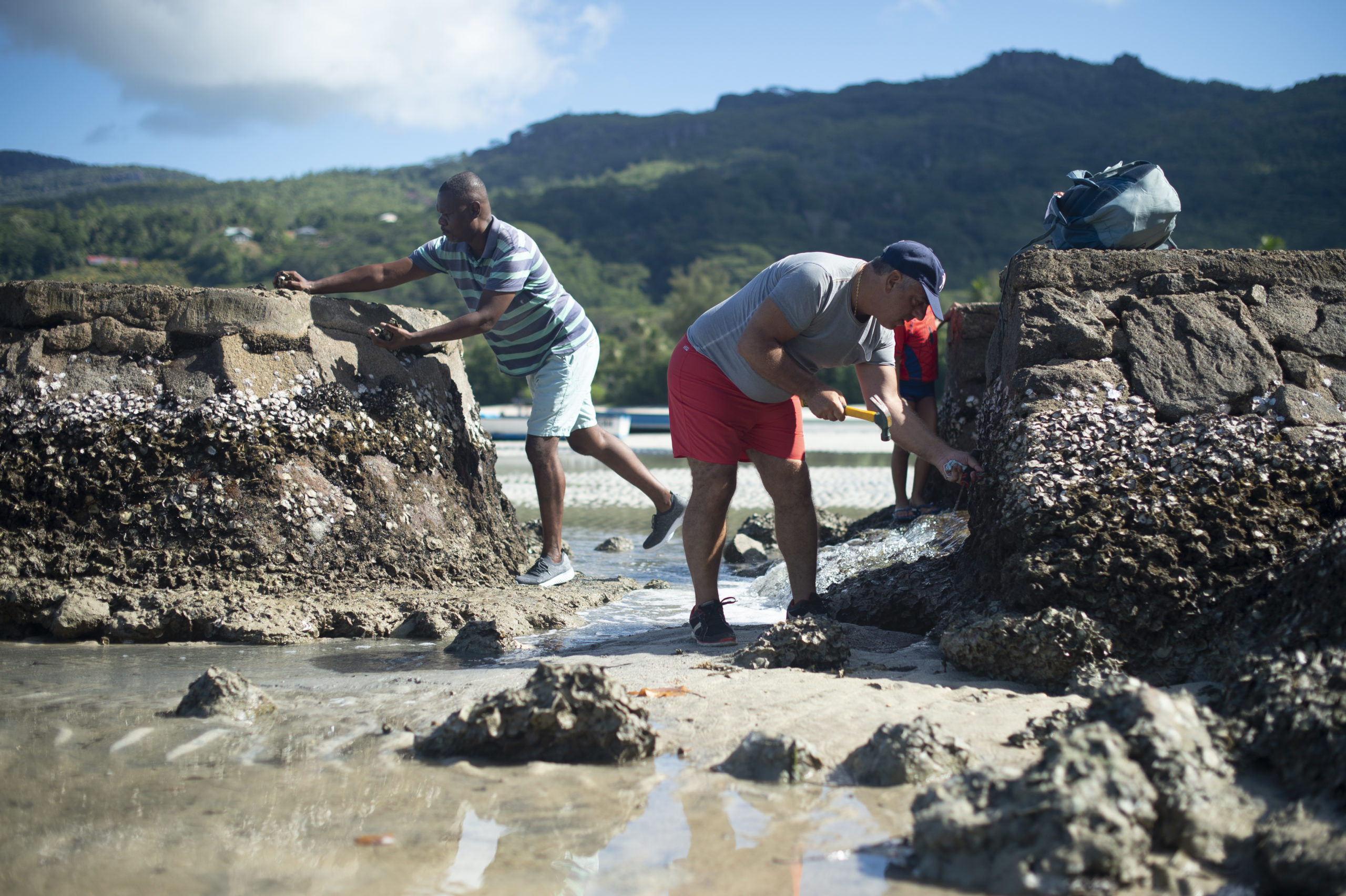BGF#4
Type: Medium
SeyCCAT strategic objective: 5
Lead Project Partner: Jacques Belle
Partners:
- Seychelles Fisheries Authorities
- Blue Economy Department / SwioFishIII
- Ortus Laboratories
- Island Developing Company
- Persand Royal Company Ltd in Mauritius
- Entreprise ostréicole SARL CABELGUEN in France
Summary:
Rock oysters (also known as Crassostrea cucullata) occur naturally in Seychelles and they can be found growing in a number of areas across Mahé as well as in other islands in the archipelago (e.g. Silhouette).
Rock Oysters can grow either on granitic rock but also on coral inert rocks they are usually found in mangrove area where there is abundant brackish water, usually on rocks by the coast where there is a mixture of seawater with fresh running water supply.
It is believed that they were introduced to Seychelles from boat hulls departing from Tanzania where there is an abundant concentration of these species. They are extremely delicious, tender and tasty. However, they are not large enough and do not occur in sufficient numbers to at least supply the local demand.
It is to be noted that in 1972, a feasibility study was undertaken by Mr. K.W Cox under the auspices of UNDP/FAO and based on his findings, he had recommended at that period three ideal sites to carry out rock oyster farming (i.e. Anse Boileau, Anse La Mouche and Port Glaud) and provided the basic environmental characteristics for such undertakings. The Cox report has determined that these undertakings could become a viable economic activity for the country but his recommendations for implementing such farming never materialized to date and apart from some efforts made in Praslin with the Oyster Pearl farm, there had never been any conclusive attempt to cultivate local rock-oysters as a commercialized edible product for local consumption. The Cox report can be viewed here http://www.fao.org/3/c8311e/C8311E00.htm.
This pilot project has been designed to undertake a feasibility study aimed at determining the economic viability of a rock oyster farm in Seychelles, the first of its kind. This study will enable us to actualize and monetize the previous feasibility study conducted out by Mr K.W.Cox 48 years ago in Seychelles so as to show that the farming of rock-oyster if properly developed could quickly become a new commercial seafood product for the local market (e.g tec tec, bigorno, bernique, prawn) especially in cold storage, wholesalers and large hotels.

Project Manager, Joseph Rath, and Marketing Director, Olivier Levi, collect naturally growing rock oysters while out scouting potential sites for rock oyster farming on the main Seychelles island of Mahé on 4 December 2021. The team are currently undergoing studies to see whether commercial rock oyster farming can be done in an economic and sustainable manner in the Seychelles.
The overall outcome of this project will be to determine that the farming of rock-oyster could become a new commercial seafood product for the local market and eventually become an income-generating industry for the country as an export item.
Specific outcomes will include determining the most suitable locations to cultivate rock oysters in line with the guidance of Cox Report including the SFA Marine culture plan; establishing the most appropriate farming methods to grow them; to creating public awareness, sensitization, participation and acceptance of the project with the local community and other stakeholders and to kick- start the marketing business plan for the commercialization process of rock oyster in the local market.
The direct beneficiaries of this project will be the people of Seychelles as this study is designed to encourage the government of Seychelles to support rock oyster farming which if developed properly will generate extra foreign exchange revenue to the country’s economy and help to bring relief to the socio-economic challenges the country is currently facing.
This pilot project is in addition links to the policy of SFA aimed at diversifying the activities within the marine environment and will be of benefit to their initiatives to conduct various species research and development for the growth and diversification of the sector.
The project required sum is 999,500 SCR and it will be implemented for two years from January 2021 to January 2023. However, the preparatory activities such as the drafting of forms for collecting field data as well as the collection of samples on potential areas to conduct the pilot project can immediately start as soon as the requested large grant is being awarded to the ‘Rock Oyster Team’ (ROT). In fact, many activities have already been undertaken by ROT and this includes seeking the commitments of key local partners and potential investors to support our study, missions in France and Mauritius engaging actively with international and regional experts to assist with the implementation of this project and identifying suitable farming sites across Mahé and other islands to implement these trials to assess the growth rate of rock oysters.
SeyCCAT funds: SCR 999,500
Co-financing:
Rock Oyster Team has received several commitments in kind-contributions which comprise mainly of assets needed for the successful implementation of the pilot project activities, they are as follows:
- 3 boats (Cap Camarat 7.5 WA Jeanneau + Scarab twin 150 HP Yamaha + Suzuki Cata Style 2 Motors 175 CV 4s strokes) total worth value 2,000,000 SCR
- 1 jeep (Tucson Hyundai 1.6 turbo) worth value 400,000 SCR
- 1 small pickup (Nissan NP200) worth value 224,000SCR
- 5 laptops (Lenovo ThinkPad 8GB, 512 SSD) total worth value 179,970 SCR
Duration: 24 months
Project Application Form: Coming soon
For more information, visit their website.
